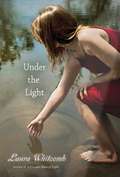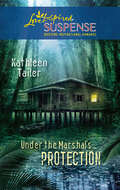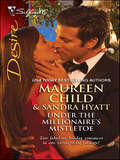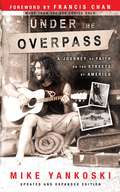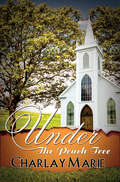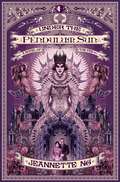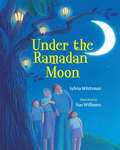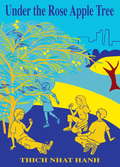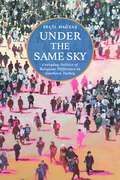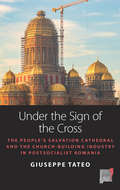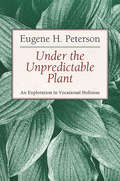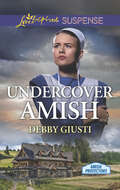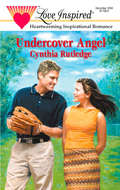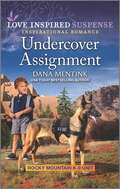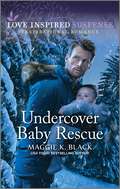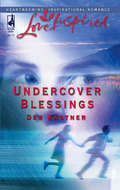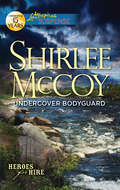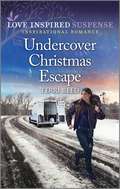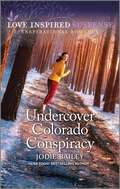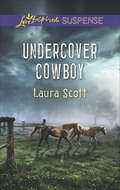- Table View
- List View
Under the Light
by Laura WhitcombHelen needed a body to be with her beloved. Jenny had to escape from hers before her spirit was broken. It was wicked, borrowing it, but love drives even the gentlest soul to desperate acts. And Helen, who has returned to help Jenny, finds herself trapped, haunting the girl she wished to save. Jenny and Billy's love story begins out-of-body and continues into the tumultuous realm of the living, where they are torn apart even as they slowly remember falling in love.
Under the Marshal's Protection
by Kathleen TailerA Florida woman helps a US Marshal arrest her brother to keep him safe in this inspirational romantic suspense thriller.Entrap her own brother for a US Marshal? Jessica Blake can’t bear the thought, but what choice does she have? It isn’t just the marshals who are after Michael. If his co-conspirators in the counterfeiting ring find him first, he won’t live long enough to clear his name. And both the US Marshals and the counterfeiters think the best way to get to Michael . . . is through Jessica. With danger on every side—for herself and for the only family she has left—Jessica must make a choice. Can she trust US Marshal Dominic Sullivan with her safety, her brother’s life . . . and her heart?
Under the Marshal's Watch
by Jaycee BullardWith innocent lives at stake, he&’ll do anything to protect them. US marshal Jimmy Flynn&’s mission to guard his witnesses in a safe house should be straightforward—until hit men breach the location with the intent to kill Isobel Carrolls and kidnap her son. Now it&’s up to Jimmy to keep Isobel and her child safe as they travel across state lines so she can testify against her criminal ex-husband. But with relentless gunmen anticipating their every move, his mission is a race against time. Can Jimmy keep them alive long enough to expose the truth…or will the dangerous pursuit cost them everything?From Love Inspired Suspense: Courage. Danger. Faith.
Under the Millionaire's Mistletoe
by Maureen Child Sandra HyattPucker up for two irresistible millionaires who are about to meet their matches...under the mistletoe!"The Wrong Brother" by Maureen ChildWell, she'd asked to be kissed. Who was Sam Hale to deny a beauty such a request? But when the businessman discovered she was Anna Cameron, the woman he'd made his brother stop dating, Sam knew trouble was brewing. Especially since his mistletoe lady was driving this noncommittal bachelor to distraction...."Mistletoe Magic" by Sandra HyattHe never expected to be kissing his "wife" under the mistletoe. Millionaire Luke Maitland had married Meg Elliot under extreme circumstances...certain they'd never be reunited. Yet even as he planned to end their temporary union, he could not ignore the intense passion between them. Was this magnate meant to be married?
Under the Northern Lights (Alaskan Quest #2)
by Tracie PetersonThough it is her search for fugitive Chase Kincaid that brings Helaina to the Alaskan Territory, it is Jacob Barringer who rattles her understanding of herself and her purpose in life. This rough, unsophisticated man continually challenges her intellect as well as her spirit. And he is entirely too handsome for his own good When Helaina s obsession with capturing Kincaid dulls her judgment, the hunter becomes the prey. Now her only hope is that Jacob will find her before it is too late.
Under the Overpass: A Journey of Faith on the Streets of America
by Mike Yankoski5th Anniversary - Updated & Expanded EditionWith Foreword by FRANCIS CHANEver Wonder What it Would Be Like to Live Homeless?Mike Yankoski did more than just wonder. By his own choice, Mike's life went from upper-middle class plush to scum-of-the-earth repulsive overnight. With only a backpack, a sleeping bag and a guitar, Mike and his traveling companion, Sam, set out to experience life on the streets in six different cities--from Washington D.C. to San Diego-- and they put themselves to the test. For more than five months the pair experienced firsthand the extreme pains of hunger, the constant uncertainty and danger of living on the streets, exhaustion, depression, and social rejection--and all of this by their own choice. They wanted to find out if their faith was real, if they could actually be the Christians they said they were apart from the comforts they'd always known...to discover first hand what it means to be homeless in America. Mike and Sam's story is gritty, challenging, and utterly captivating. What you encounter in these pages will radically alter how you see your world--and may even change your life. This updated and expanded edition contains added stories, an interview with the author, a "five years after" bonus chapter, and a new foreword from Francis ChanFrom the Trade Paperback edition.n everything in a full embrace of the homeless life. Some experiences were uncomfortable, some shocking, some disturbing, some hilarious, and still others frustrating, but five months of life on the streets has left us, our faith, and our lives forever changed."From the Trade Paperback edition.
Under the Peach Tree
by Charlay MarieHope grew up feeling ugly and unloved. Called "the devil" by her mother, she was not allowed to attend church on Sundays with her twin sister, Faith. At fifteen, Hope is wild. She no longer cares about her mother, or anyone else for that matter.When her mother kicks her out of the house, Hope spends several days homeless and alone--until she runs into an elderly blind prophetess named May. She offers Hope a gift from God: a new home where she is taught the true meaning of love, family, and God.When Hope meets Dante, a quirky yet attractive boy who visits with May every day, her life changes even more. With young love in the air, Hope feels like nothing can go wrong. But just when she thinks her life is perfect, she learns that May is dying of cancer. Hope must learn how to conquer her deepest fears and have faith that all things work together for the good of God. With everything she's experienced in her young life, will she be able to trust God?
Under the Pendulum Sun
by Jeannette NgVictorian missionaries travel into the heart of the newly discovered lands of the Fae, in a stunningly different fantasy that mixes Crimson Peak with Jonathan Strange & Mr Norrell. Catherine Helstone’s brother, Laon, has disappeared in Arcadia, legendary land of the magical fae. Desperate for news of him, she makes the perilous journey, but once there, she finds herself alone and isolated in the sinister house of Gethsemane. At last there comes news: her beloved brother is riding to be reunited with her soon – but the Queen of the Fae and her insane court are hard on his heels.File Under: Fantasy [ In Arcadia | Seek and Hide | The Queen of Moths | Lands of the Damned ]
Under the Ramadan Moon
by Sylvia Whitman Sue WilliamsWe wait for the moon. We watch for the moon. We watch for the Ramadan moon.We give to the poor, and read Qur'an, under the moon.We live our faith, until next year under the moon, under the moon, under the Ramadan moon. Ramadan is one of the most special months of the Islamic year, when Muslims pray, fast, and help those in need. Sylvia Whitman's lyrical story, with luminous illustrations by Sue Williams, serves as an introduction to Ramadan--a time for reflection and ritual with family and friends. A detailed note about Ramadan is included. The author lives in Virginia and wrote this story so her son's classmates could learn how he and his family celebrate this important time. The illustrator lives in England. <p><p> <i>Advisory: Bookshare has learned that this book offers only partial accessibility. We have kept it in the collection because it is useful for some of our members. Benetech is actively working on projects to improve accessibility issues such as these.</i>
Under the Rose Apple Tree
by Thich Nhat Hanh Philippe AmesIn this sequel to A Pebble for Your Pocket, Zen teacher and poet Thich Nhat Hanh looks deeply at the issues that confront young people in today's society. Applying his unique insights to anger, family conflict, drug use, and sexual responsibility, he makes the ancient teachings of the Buddha relevant to adolescents by offering mindfulness practices as tools to help transform the suffering in their everyday lives. Ages 10-13."By living your life beautifully, you can nourish your sisters, brothers, and future generations. It is not through sacrificing your life that you help future generations, it is by living fully and happily." - Thich Nhat Hanh, from Under the Rose Apple Tree
Under the Rose Apple Tree
by Thich Nhat Hanh Philippe AmesIn this sequel to A Pebble for Your Pocket, Zen teacher and poet Thich Nhat Hanh looks deeply at the issues that confront young people in today's society. Applying his unique insights to anger, family conflict, drug use, and sexual responsibility, he makes the ancient teachings of the Buddha relevant to adolescents by offering mindfulness practices as tools to help transform the suffering in their everyday lives. Ages 10-13.
Under the Same Sky: Everyday Politics of Religious Difference in Southern Turkey
by Seçil DaǧtașAn ethnographic study of the everyday lives of religious minorities near Turkey’s border with SyriaHow do people coexist in a world shaped by longstanding differences, political instability, and recurrent displacement? In Under the Same Sky, Seçil Daǧtaș addresses this question by exploring the everyday politics of religious difference among minority communities in Turkey’s southern borderlands.In a region often portrayed through the lens of conflict and division, this ethnography brings to life the subtle, often overlooked negotiations occurring in social spaces such as bustling city bazaars, shared worship sites, interfaith unions, home gatherings, and a multireligious choir. Set against the backdrop of major political upheavals in Turkey and Syria before the 2023 earthquakes devastated the region, the book demonstrates how Arab ‘Alawis, Christians, and Jews, alongside their Sunni Muslim neighbors, use familiar social idioms—kinship, hospitality, love, and companionship—to reproduce religious differences.Daǧtaș argues that religious difference is more than an identity marker for these communities, as it is often treated in studies focused on statecraft or political movements. It is a dynamic aspect of social relations which is constantly redefined by race, class, citizenship, and gender, and unsettled by overlapping practices and multireligious belonging. Under the Same Sky focuses on religious difference as lived and reworked in daily encounters—within the larger context of a majoritarian Turkish Sunni state—inviting readers to reconsider secularism, religious plurality, and the nature of political life.
Under the Shadow of the Rising Sun: The True Story of a Missionary Family's Survival and Faith in a Japanese Prisoner-of-War Camp During W. W. II
by Donald Ernest Mansell Vesta West MansellA WWII memoir of prison and Providence. 18-year-old Donald Mansell, his brother and parents were sailing to Africa as missionaries when America plunged into World War II. Fleeing for safety to the Philippines, they instead found themselves prisoners of the Japanese army, spending the next three years in a concentration camp. Donald's world revolved between hunger, weevils, lack of privacy, and numbing routine. He witnessed torture and brutality, fought off despair, and escaped death several times. Under the Shadow of the Rising Sun is an honest, gripping, sometimes whimsical account of daily life as a prisoner of war. Through the eyes of a survivor, we discover the role of trials in developing faith, and we see the intervention of a merciful Providence in an unforgettable true-life adventure.
Under the Sign of the Cross: The People’s Salvation Cathedral and the Church-Building Industry in Postsocialist Romania (Space and Place #18)
by Giuseppe TateoBased on extensive ethnographic research, this book delves into the thriving industry of religious infrastructure in Romania, where 4,000 Orthodox churches and cathedrals have been built in three decades. Following the construction of the world’s highest Orthodox cathedral in Bucharest, the book brings together sociological and anthropological scholarship on eastern Christianity, secularization, urban change and nationalism. Reading postsocialism through the prism of religious change, the author argues that the emergence of political, entrepreneurial and intellectual figures after 1990 has happened ‘under the sign of the cross’.
Under the Unpredictable Plant: An Exploration in Vocational Holiness
by Eugene H. PetersonIn Under the Unpredictable Plant respected pastor, author, and educator Eugene Peterson clarifies the pastoral vocation by turning to the biblical book of Jonah, in which he finds a captivating, subversive story that can help pastors recover their "vocational holiness". Using the Jonah story as a narrative structure, Peterson probes the spiritual dimensions of the pastoral calling and seeks to reclaim ground taken over by those who are trying to enlist pastors in religious careers. Under the Unpredictable Plant: An Exploration in Vocational Holiness is the third of three books on the work of pastors in North America. The three books together are designed to provide a biblical orientation and theological understanding in cultural conditions decidedly uncongenial to such orientation and understanding. This third volume uses the narrative of Jonah as a structure for recovering the spiritual dimensions of the pastoral vocation in an age that relentlessly secularizes it into career development. Holiness, the cultivated habit of responding to God word instead of fitting into the world's program, emerges as the vocational distinctive. The first two books in the series are Five Smooth Stones for Pastoral Work and Working the Angles: The Shape of Pastoral Integrity.
Under the Unpredictable Plant: An Exploration in Vocational Holiness
by Eugene PetersonLike Eugene Peterson's other books on pastoring, Under the Unpredictable Plant is full of stimulating insights, candid observations, and biblically grounded prescriptions. Yet this book emanates with a special poignancy out of Peterson's own crisis experience as a pastor. Peterson tells about the "abyss," the "gaping crevasse," the "chasm" that he experienced, early in his ministry, between his Christian faith and his pastoral vocation. He was astonished and dismayed to find that his personal spirituality, his piety, was inadequate for his vocation -- and he argues that the same is true of pastors in general. In the book of Jonah -- a parable with a prayer at its center -- Peterson finds a subversive, captivating story that can help pastors recover their "vocational holiness." Using the Jonah story as a narrative structure, Peterson probes the spiritual dimensions of the pastoral calling and seeks to reclaim the ground taken over by those who are trying to enlist pastors in religious careers.
Undercover Amish: Second Chance Amish Bride Undercover Amish (Amish Protectors)
by Debby GiustiHunted by criminals, a woman joins an ex-cop as Undercover Amish in this romantic suspense novel from an award-winning author.After Hannah Miller’s mother is murdered and her sisters go missing, someone comes after her. Now the only way she can survive is to entrench herself in an Amish community—and rely on Lucas Grant, a former police officer who is planning to join the Amish faith, for protection.But finding refuge for Hannah—disguised as Plain at a secluded inn—pulls Lucas back into his old life. And when Lucas discovers the criminals after them may be the people who killed his partner, the mission to take them down becomes personal. With the assailants closing in, though, can Lucas stop them—and finally put his past behind him to start an Amish life with Hannah?Amish Protectors seriesAmish RefugeUndercover AmishAmish RescueAmish Christmas Secrets
Undercover Angel
by Cynthia RutledgeAngel Morelli, a beautiful undercover cop, poses as a student to bust a drug ring. Unexpectedly, she falls in love with her handsome history teacher, Jake. After realizing who she really is, Jake quickly falls in love, allowing him to make peace with his troubled past and find his way back to God.
Undercover Assignment (Rocky Mountain K-9 Unit #4)
by Dana MentinkFrom USA TODAY bestselling author Dana Mentink. This K-9 will stop at nothing to keep a child safe When a little boy is threatened, Officer Daniella Vargas and K-9 partner, Zara, are assigned to pose as his nanny to uncover the culprit&’s identity. Suspecting one of the guests in his inn, widower Sam Kavanaugh&’s only option is to begrudgingly trust Daniella and Zara to help. But can they solve the case and its mysterious connection to Sam&’s late wife before it&’s too late?From Love Inspired Suspense: Courage. Danger. Faith.Rocky Mountain K-9 Unit Book 1: Detection Detail by Terri ReedBook 2: Ready to Protect by Valerie HansenBook 3: Hiding in Montana by Laura ScottBook 4: Undercover Assignment by Dana MentinkBook 5: Defending from Danger by Jodie BaileyBook 6: Tracking a Killer by Elizabeth Goddard
Undercover Baby Rescue
by Maggie K. BlackThis officer will do anything to save his stolen newborn nephew… A dangerous organization is kidnapping and trafficking newborns—and Officer Justin Leacock&’s nephew is their latest victim. To save the stolen baby, Justin will have to go undercover as a married couple with his former fiancée, Detective Violet Jones. Except finding the boy isn&’t enough. Now they must outwit the kidnappers on their tail and survive the ruthless icy wilderness, too…From Love Inspired Suspense: Courage. Danger. Faith.
Undercover Blessings
by Deb KastnerWorking undercover to protect a mother and child from the kidnappers whose crime the mother witnessed, an FBI agent soon finds himself falling in love. Original.
Undercover Bodyguard
by Shirlee MccoyBakery owner Shelby Simons can't deny a stalker is after her. Still, knowing she's at risk is one thing. Admitting she needs a bodyguard is quite another. Especially when the bodyguard is Ryder Malone. The former SEAL is too big, too tough and way too attractive. Yet Ryder won't take no for an answer. If she can't find a place for him in her life, he'll make one, working undercover to protect Shelby and find her attacker. But as Ryder and Shelby get closer to answers-and each other-the killer starts closing in....
Undercover Christmas Escape
by Terri ReedAn undercover mission has deadly consequences The assignment was simple: infiltrate an office Christmas party, gather evidence and take down a drug cartel. However, DEA agent Duncan O&’Brien and deputy US marshal Sera Morales encounter more than they were expecting when masked thieves crash their undercover operation and abduct Sera, who narrowly escapes. Can Duncan and Sera work together, despite their competitiveness and hidden attraction, to capture a merciless drug lord—before this Christmas becomes their last?From Love Inspired Suspense: Courage. Danger. Faith.
Undercover Colorado Conspiracy
by Jodie BaileyAn undercover mission turns into a fight for survival To expose a crooked adoption agency, military investigators Thalia Renner and Phillip Campbell pose as a married couple at a mountain resort. But when they become the target of unknown enemies and deadly assaults, they wonder if their cover has been blown. As they investigate, they learn the truth is far more sinister…and the consequences could cost them their lives. From Love Inspired Suspense: Courage. Danger. Faith.
Undercover Cowboy
by Laura ScottRunning from the MobFBI agent Logan Quail puts his life and career in jeopardy when he blows his cover to save Kate Townsend from a mafia goon. He wasn't able to save his fiancée from Bernardo Salvatore's violent syndicate, but this time he'll make sure that Kate Townsend doesn't get herself killed trying to prove her father was murdered. Now Logan and Kate must work together, each overcoming their separate grief, to bring down a ruthless mob boss. And maybe find some peace through the healing power of love.
